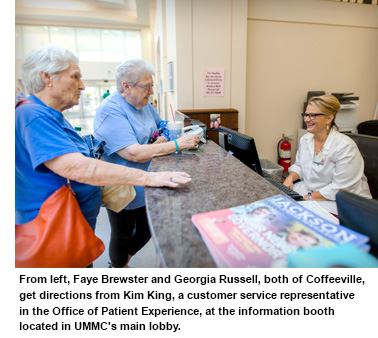And Now a Word About Our Culture
Good morning!
I had an opportunity this week to get a preview of a new initiative being deployed through the Office of Patient Experience.
I will call it the “Always/Never” Campaign.
It refers to language and behaviors that we should always use with our patients and their families, and conversely, the things that we should never say or do in these interactions.
 For example, members of the care team – and that includes everyone who interacts with the patient in any way – should always introduce themselves.
For example, members of the care team – and that includes everyone who interacts with the patient in any way – should always introduce themselves.
On the flip side, they should never blame another department for deficits in service. (Now ask yourself, “How often does that happen here?!”)
The idea is that the language and behavior we use in everyday interactions are expressions of our culture. Ideally, these expressions should convey respect and empathy, not just for patients and their families, but for co-workers, visitors, students – everyone. The always/never concept is a way of simplifying this idea to its essence.
This model was developed a few years ago by a private hospital in New York. In a case study, the authors cited these examples of inappropriate responses from team members:
- “We’re understaffed,” in explaining a delayed response to a patient call bell.
- “I’m on break,” in responding to being asked directions by a family member.
Hospital leadership recognized the need to develop patient-centered communication skills, rooted in a culture of professionalism. Why? Because every interaction with a patient and family – from the registration desk to the attending physician, from the night shift nurse to the housekeeper – represents a “moment of truth” in which language and behavior make lasting impressions.
It’s worth noting that the New York hospital went through a process of developing the always/never behaviors, engaging staff in that creative activity. That process also demonstrated the importance of buy-in and continuous modeling of these behaviors by leadership, as well as the need for team members to hold each other accountable. Indeed, that’s what culture does – it calls out members of the group who are non-conforming to the prevailing norms.
With that introduction, the Office of Patient Experience has been working behind the scenes to develop the first set of UMMC “always/never” standards that were unveiled this week:
We will always
- Make eye contact
- Start with a greeting
- Introduce ourselves and state our purpose
We will never
- Avoid eye contact
- Ignore the person in front of us
- Assume that people know who we are and what we do
Although I hope it’s obvious, you might ask, “Why does all this matter?”
Well, it turns out that the way patients perceive us, as reflected in their post-discharge experience surveys, has real consequences. Their evaluations contribute to our overall quality scores that Medicare uses to grade our hospitals. Those publicly available grades not only assist consumers in deciding where they choose to receive care, they directly reduce or increase our Medicare reimbursement relative to other hospitals. That’s real money that funds our operations.
But even if all that wasn’t at stake, wouldn’t we want to model these behaviors to our patients?
I know the answer is an overwhelming “yes,” because I see and hear about our excellent service every day. I also know that we can be inconsistent from unit to unit and from employee to employee in living up to these standards. This sampling of real comments from our patient experience surveys demonstrates that inconsistency:
“Never showed any signs of good customer service.”
“Great customer service.”
“You all should try customer service training.”
“Staff lacked communication, empathy and consideration.”
“Better customer service top to bottom than the last 8 years!”
“Great customer service and very friendly. Made me feel relaxed.”
“Our concerns were acknowledged with empathy.”
“People are very nice.”
I think this “Always/Never” Campaign is a wonderful idea and I encourage you to embrace it and talk about it with your colleagues. Kudos to the leaders of the Office of Patient Experience, Skye Stoker and Dr. Lisa Didion, and to our Patient Experience Champions Team of hospital providers, managers and directors who are rolling out this program across the organization.
Making these commitments to our patients to be our best possible selves will be its own reward, and will help propel us toward our goal of A Healthier Mississippi.



